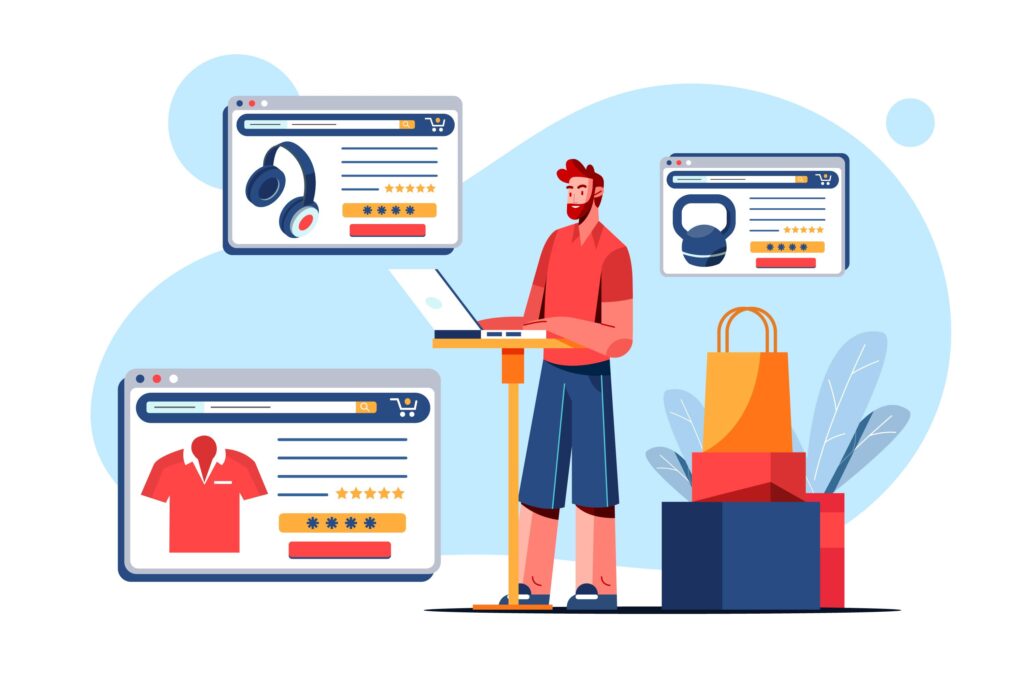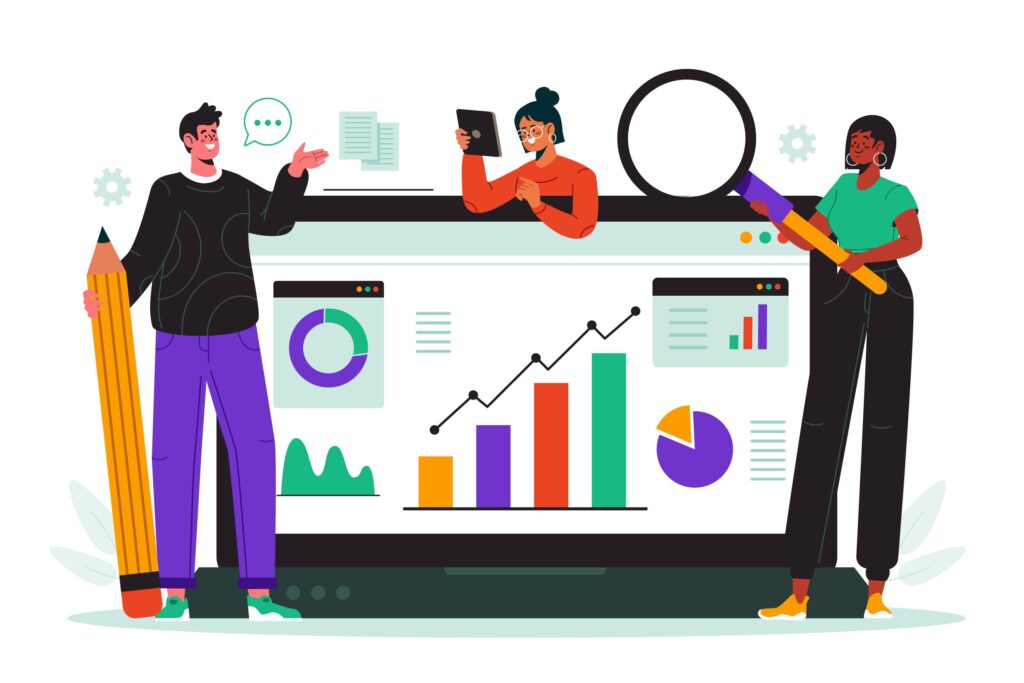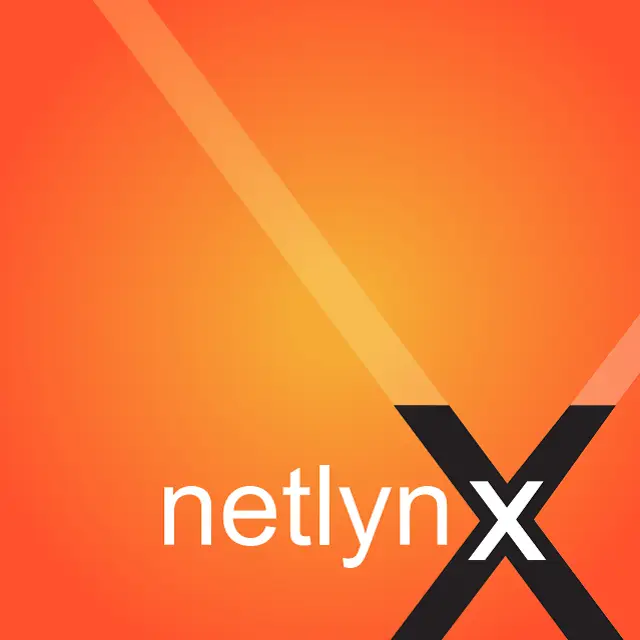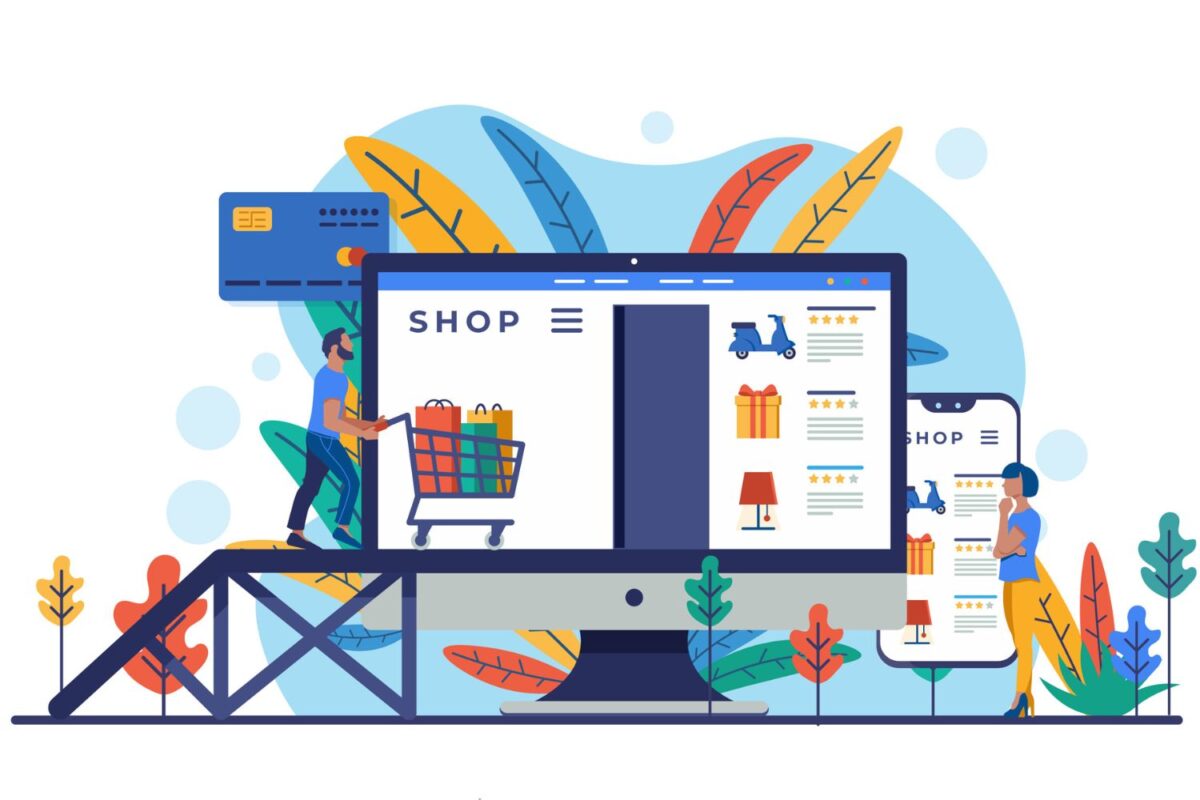Did you know that Shopify Plus is the leading platform for B2C selling, making it effortless for businesses to reach their customers? Whether you’re a small online store or a large enterprise, Shopify Plus offers powerful tools and features designed specifically for B2C selling. In this blog, we will explore how Shopify Plus Store simplifies the process of selling directly to consumers and enables businesses to scale their operations with ease. From customizable storefronts to seamless integrations, get ready to discover why Shopify Plus Store is the ultimate solution for B2C sellers looking to maximize their potential in today’s competitive market.
What is B2C Selling?
B2C selling is the process of selling products or services directly to consumers. This can be done through a variety of channels, such as online stores, brick-and-mortar stores, or even door-to-door sales. B2C selling is important in today’s business landscape because it allows businesses to reach a wider audience and generate more sales. With the rise of e-commerce, businesses can now sell their products to consumers all over the world. This has led to a boom in B2C sales in recent years.
Businesses engaged in B2C selling face a number of unique challenges, including:
-
High competition
There are a large number of businesses competing for the attention and dollars of consumers. This can make it difficult to stand out from the crowd and attract customers.
-
Volatile demand
Consumer demand can fluctuate rapidly, making it difficult to forecast sales and ensure that you have enough inventory on hand.
-
Complex pricing
B2C businesses often have to deal with complex pricing structures, including discounts, coupons, and shipping charges. This can make it difficult to calculate the final price of a product or service and can lead to customer confusion.
-
Returns and refunds
B2C businesses often have to deal with a high volume of returns and refunds. This can be costly and time-consuming to process.
-
Customer service
B2C businesses must provide excellent customer service to compete. This can be challenging, as consumers have high expectations for customer service.
Shopify Plus is a powerful and scalable platform designed specifically for high-growth businesses. With its robust features and flexibility, Shopify Plus has become the go-to solution for companies looking to optimize their online sales channels. Whether you’re a well-established brand or just starting out, this overview of Shopify Plus will guide you through its key features, the difference between Shopify and Shopify Plus, and success stories. Get ready to unlock the full potential of your online store with this game-changing platform.
Shopify Plus Store offers robust features tailored to meet the complex needs of B2C sellers, making it easier than ever to manage sales, streamline operations, and drive growth.
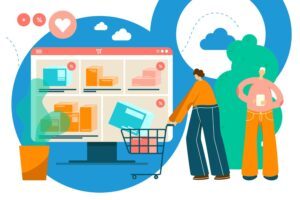
Key Features for B2C Selling on Shopify Plus
As the digital marketplace evolves at an unprecedented pace, businesses need to adapt swiftly to meet their customers’ ever-changing expectations. When it comes to B2C selling, there’s no better platform than Shopify Plus Store to secure your e-commerce success. Packed with an array of cutting-edge features, Shopify Plus empowers businesses to create seamless online experiences, drive conversions, and ultimately, skyrocket their growth.
Shopify Plus boasts an intuitive, user-friendly interface that allows even the most novice sellers to effortlessly navigate the platform. With its simple and streamlined design, managing products, orders, and customer data has never been easier. Merchants are equipped with a centralized dashboard that provides real-time insights, enabling them to monitor their store’s performance and make data-driven decisions. This data-driven approach is vital for a successful B2C strategy, as it helps identify trends, optimize marketing efforts, and boost customer engagement.
Here are the top features for B2C Selling on Shopify Plus:
Customizable Sales Channels
Shopify Plus Store offers an exceptional range of sales channels that can catapult your business toward unprecedented success. With this comprehensive platform, you gain access to a multitude of avenues, allowing you to showcase your products and engage with customers in innovative ways.
Shopify Plus offers a variety of sales channels that businesses can use to sell their products. These channels include:
-
Online Store
The online store is the primary sales channel for Shopify Plus businesses. It allows businesses to sell their products on their own website. The online store is customizable and can be branded to match the business’s unique style. It also includes a variety of features that make it easy for customers to shop, such as a shopping cart, checkout process, and shipping calculator.
-
Marketplaces
Shopify Plus businesses can also sell their products on third-party marketplaces, such as Amazon, eBay, and Walmart. This can help businesses reach a wider audience and increase their sales. Marketplaces typically have a large number of buyers, which can be a great way to get your products in front of more people. However, marketplaces also charge fees, so businesses need to factor this into their pricing.
-
Social Media
Shopify Plus businesses can also sell their products on social media platforms, such as Facebook, Instagram, and Pinterest. This can be a great way to connect with potential customers and drive traffic to their online store. Social media platforms allow businesses to create engaging content that can attract and retain customers. They also offer a variety of advertising options that can help businesses reach their target audience.
-
Direct Mail
Shopify Plus businesses can also sell their products through direct mail campaigns. This can be a targeted way to reach potential customers who are interested in their products. Direct mail campaigns typically involve sending physical mail pieces, such as catalogues or postcards, to potential customers. This can be a great way to build brand awareness and generate leads.
-
Wholesale
Shopify Plus businesses can also sell their products wholesale to other businesses. This can be a great way to reach a wider audience and increase sales. Wholesale sales typically involve selling products to businesses at a discounted price. This can be a good option for businesses that have a large inventory of products or are looking to expand into new markets.
-
B2B
Shopify Plus businesses can also sell their products to businesses, such as other retailers, distributors, and manufacturers. This can be a great way to grow their business and reach new customers. B2B sales typically involve selling products to businesses at a discounted price. This can be a good option for businesses that have a large inventory of products or are looking to expand into new markets.
Shopify Plus Store is an all-encompassing platform that allows you to explore and capitalize on various sales channels. From social selling to marketplaces, and mobile commerce to in-store experiences, this powerful platform ensures that you never miss an opportunity to connect with your customers. So, embark on this exciting journey and unlock unlimited potential for your business with Shopify Plus.

Advanced Inventory Management
Inventory management is a crucial aspect of running a successful e-commerce business. As your business grows, so does the complexity of tracking stock levels across multiple locations or warehouses. Thankfully, Shopify Plus understands the challenges and offers comprehensive inventory management tools that simplify this tedious process. With their advanced system, you can effortlessly monitor and manage inventory across different locations, ensuring accurate stock levels at all times.
Shopify Plus offers a variety of inventory management tools that can help businesses track stock levels across multiple locations or warehouses. These tools include:
-
Real-time Inventory Tracking
Shopify Plus’s real-time inventory tracking allows businesses to see how many products are available in each location or warehouse at any given time. This information can be accessed from the Shopify admin panel or through the Shopify mobile app.
-
Distributed Inventory
Shopify Plus’s distributed inventory allows businesses to sell products from multiple locations or warehouses. This can help businesses to improve customer service by ensuring that products are always available, even if one location or warehouse is out of stock.
-
Transfers and Shipments
Shopify Plus’s transfers and shipments tools allow businesses to easily move products between locations or warehouses. This can help businesses to optimize their inventory and ensure that products are always where they need to be.
-
Low Stock Alerts
Shopify Plus’s low stock alerts allow businesses to be notified when a product is running low in stock. This can help businesses to avoid stockouts and keep customers happy.
-
Backorders
Shopify Plus’s backorders allow businesses to accept orders for products that are not currently in stock. This can help businesses improve customer service by allowing customers to place orders even if the products are not immediately available.
Shopify Plus understands the complexity of tracking stock levels across multiple locations or warehouses. Their inventory management tools empower businesses to streamline and simplify this process. By offering a centralized dashboard, stock alerts, integration with warehouse management systems, and robust reporting capabilities, Shopify Plus enables you to confidently manage your inventory, avoid stockouts, and ultimately provide a seamless shopping experience for your customers.
Optimized Order Processing
Order processing workflows play a pivotal role in today’s fast-paced business environment, especially when dealing with large volumes of orders from multiple clients. Streamlining these workflows not only saves valuable time but also significantly reduces errors, helping businesses maintain their competitive edge. By implementing an efficient order processing system, companies can effectively manage the influx of orders, ensuring seamless execution from start to finish.
Shopify Plus Store offers a variety of features that can help businesses streamline their order processing workflows, which include:
-
Bulk Order Creation
Shopify Plus allows businesses to create bulk orders, which can save time and reduce errors. Businesses can create bulk orders for multiple products, customers, or shipping addresses.
-
Order Management Tools
Shopify Plus offers a variety of order management tools that can help businesses track orders, manage inventory, and fulfill orders.
-
Automated Invoicing
Shopify Plus can automatically generate invoices for orders. This can save businesses time and ensure that invoices are always accurate. Businesses can also customize their invoices to include their branding and other information.
-
Customer Support Tools
Shopify Plus offers a variety of customer support tools that can help businesses answer customer questions, resolve issues, and provide excellent customer service.
-
Integrated Shipping Solutions
Shopify Plus integrates with a variety of shipping providers, such as UPS, FedEx, and DHL. This allows businesses to easily calculate shipping rates and print shipping labels. Businesses can also track the status of their shipments.
-
Reporting and Analytics Tools
Shopify Plus offers a variety of reporting and analytics tools that can help businesses track their sales, traffic, and other metrics.

Enhanced Security and Scalability
When it comes to B2C transactions, one cannot underestimate the paramount importance of Shopify Plus security. In the modern digital landscape, where cyber threats loom large, safeguarding customer data and ensuring secure transactions are of utmost significance. Shopify Plus Store acknowledges this growing concern and takes several measures to maintain the trust and confidence of its users.
As an enterprise-level platform, Shopify Plus incorporates robust security protocols that effectively combat potential threats. The platform employs worldwide security standards, such as PCI DSS compliance, ensuring that sensitive customer information, such as credit card details, remains protected at all times. By adhering to these stringent regulations, Shopify Plus assures both businesses and consumers that their personal and financial information is handled securely.
Shopify Plus Store ensures data protection, compliance with industry standards, and scalability to handle growing business needs through the following measures:
-
Data protection
Shopify Plus uses a variety of security measures to protect customer data, including, Data encryption, Physical security, Access controls, and Auditing.
-
Compliance with industry standards
Shopify Plus is compliant with a variety of industry standards, including, PCI DSS, GDPR, and HIPAA.
-
Scalability
Shopify Plus is designed to scale to meet the needs of growing businesses. Shopify Plus can handle up to 100,000 concurrent users and 100 million page views per day.
-
Data backup
Shopify Plus automatically backs up customer data daily.
-
Data loss prevention
Shopify Plus uses data loss prevention (DLP) tools to prevent sensitive data from being lost or leaked.
-
Security awareness training
Shopify Plus offers security awareness training to its employees to help them protect customer data.
Security should be a top priority for businesses engaging in B2C transactions, and Shopify Plus understands this implicitly. With its comprehensive security measures, adherence to global standards, advanced fraud detection system, and customizable options, Shopify Plus empowers businesses to create a safe and secure environment for their customers. By choosing Shopify Plus, businesses can have peace of mind knowing that their e-commerce platform prioritizes the security of their valuable data and the trust of their customers.
Shopify VS Shopify Plus
As an aspiring online entrepreneur or an established business owner, choosing the right e-commerce platform is paramount to your success. So, let’s delve into the world of Shopify and Shopify Plus, the two powerhouses that consistently rank at the top of the e-commerce arena.
If you are just starting out, Shopify is likely your go-to choice. With its user-friendly interface and extensive app library, this platform caters to all levels of experience. Whether you are an industry newbie or a seasoned pro, Shopify offers a comprehensive suite of features to help you build, manage, and market your online store effortlessly.
But what sets Shopify Plus apart from Shopify?
Shopify is a hosted platform, which means that Shopify hosts the website and takes care of all the technical aspects of running the store. This makes it a good option for businesses that don’t have a lot of technical expertise. Shopify offers a variety of features and integrations that can help businesses sell their products online, such as:
- Drag-and-drop website builder
- Payment processing system
- Shipping calculator
- Marketing suite
- Reporting dashboard
Shopify Plus is a more advanced platform that is designed for businesses that need more features and flexibility. Shopify Plus is not hosted, which means that businesses need to have their own web hosting provider. However, Shopify Plus offers a wider range of features and integrations than Shopify, such as:
- Handles more traffic
- Sells more products
- Customize the platform
- Integrate with third-party software
Pros and cons of Shopify and Shopify Plus:
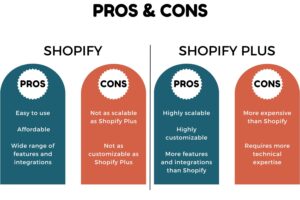
Shopify Plus: Success Stories
Decathlon
Decathlon, based in France, is the largest sporting goods retailer in the world with upwards of 1,697 stores across 60 countries and regions. Decathlon taps into 50% more powerful analytics with ShopifyQL Notebooks for smarter business decisions.
- Industry: Apparels
- Previous platform: None
- Use case: Migration
- Product: Shopify Plus, ShopifyQL Notebooks
With ShopifyQL Notebooks, Decathlon saw results fast:
- 50% faster reporting
- 60% faster data analysis through ready-to-use reporting templates
- A holistic view of the business through enhanced data exploration, analysis, and storytelling capabilities
Heinz
For over 150 years, Heinz has been celebrated for its wide range of food and condiments, which have long been available to consumers around the world through department stores and other retail outlets.
- Industry: Food and Beverage
- Previous platform: None
- Use case: Speed to launch
- Product: Shopify Plus
With Shopify Plus, Heinz was able to:
- Launch a direct-to-consumer offering in one week
- Lay the foundations of a new business model
- Make food products available to vulnerable populations and essential workers
Samsonite
Samsonite is a global leader in travel bags, luggage, and accessories. The 100+ year legacy brand is best known for combining memorable style and rich design technology to produce durable, high-quality products that are perfect for the on-the-go lifestyle of business professionals and jetsetters alike.
- Industry: Fashion and Apparel
- Previous platform: VTEX
- Use case: Global commerce, Cost-effectiveness, Replatforming
- Product: Shopify Plus, Launchpad, Shopify Flow
By migrating to Shopify Plus, Samsonite was able to:
- Launch 12 websites across Latin America in just 6-9 months
- Increase conversions an estimated 5-10% across those sites
- Customize checkout to alleviate payment option and shipping difficulties specific to Latin America
- Improve the overall user and customer experience in Latin America
Source: Shopify
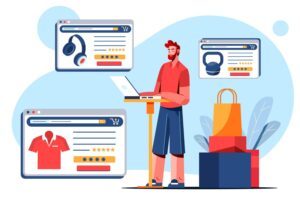
Conclusion
In conclusion, Shopify Plus truly revolutionizes B2C selling by providing an all-in-one platform that effortlessly streamlines and scales your business operations. With its array of built-in features and seamless integrations, you can focus on what matters most: delivering exceptional customer experiences and driving revenue growth. From customizable storefronts to advanced analytics and marketing tools, Shopify Plus empowers businesses to stay ahead in the competitive e-commerce landscape. Whether you’re a small startup or an established enterprise, this powerful platform is designed to support your unique needs and ambitions. So why wait? Join the thousands of successful brands already leveraging Shopify Plus and unlock endless possibilities for your B2C business today! Remember, with Shopify Plus at your fingertips, effortless success is just a few clicks away.
To know more about Shopify or Shopify Plus Store enquiry get in touch with us and Netlynx Inc. team of Shopify experts will help you with all your queries.

